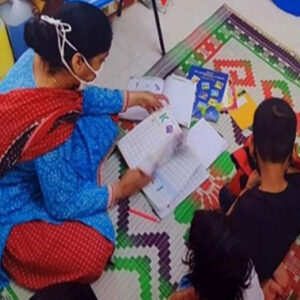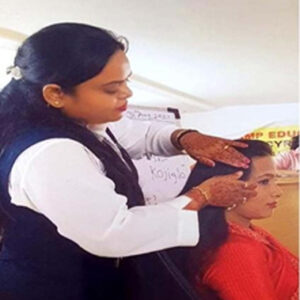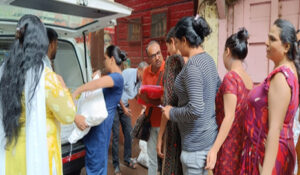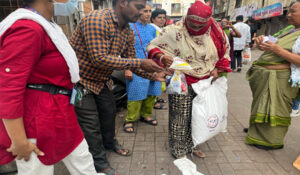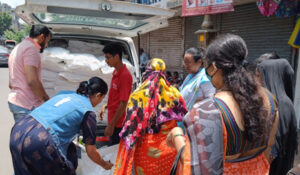SRHR Project for women in sex work (In collaboration with SANGAMA(Karnataka), SIAAP- South India AIDS Action Plan-Tamil Nādu, Supported by Amplify change (UK)
Project Description-
India has nearly ten million female sex workers (FSWs). Sex work is not illegal but the current law (Immoral Traffic
Prevention Act) criminalizes related activities, with devastating consequences. We have found that the intransigent
stigma and discrimination of sex workers is a major barrier to their access to public SRH services, especially for abortion
and contraception, intimate partner violence (IPV) and mental health. This has become even more difficult with the pandemic crisis.
1) Growing a stronger SRHR movement by empowering sex workers to advocate as a community
– Capacity building of sex workers for collective advocacy
– Cross-learning advocacy initiatives between SW and non-SW collectives
– Continuing to build leadership for SRHR through peer leader training
– Establishing sex worker community-based crisis response teams
2) Improving access to comprehensive SRH and well-being services and information through policy and community advocacy
Advocating at state level for the acceptance of the SW-sensitive SRH service guidelines we developed in our current project
Facilitating acceptance of the SW-sensitive SRH service guidelines to be embedded in state and regional health facilities
– SRHR Education among FSWs on safer sex in the context of COVID-19
3) Organisational strengthening to enhance the effectiveness of the coalition, particularly in the COVID-19 context
– Establishing Online platforms for outreach and advocacy, and trialling same within the SW community
– Establishing Online Financial and Human resource management systems
– Developing policies and procedures on: Financial and Legal compliance, safeguarding staff well-being, and online safety
– Developing Fundraising and Communications skills and capacity of coalition members
4) Generating evidence of the impact of COVID-19 on SRHR in the SW community
– Collecting, analysing and disseminating data on the impact of Covid-19 on SWs
– Developing narratives on this impact for advocacy, sharing and policy development
– Using evidence to push for the inclusion of SWs in COVID-19 prevention and relief measures
Covid 19 Relief work-
Since March 2020, everyone’s daily lives have taken a turn and have not yet returned to normal. The women in sex work are the part of the marginalized group that suffered the worse.
The women lost their work and their income overnight and are still struggling financially. A lot of children of our women stay in hostels and child care institutions. All these children were suddenly sent back home and have been staying with their mothers in brothels since.
The financial difficulties rendered a lot of women out of basic ration and necessary items in their kitchens. A lot of women living outside of brothels, away from the red light area were unable to pay their rent. Brothels where all the women cook together experienced shortage of gas cylinders and were also unable to pay for the separate ones.
Along with the hardships the financial crunch brought, the lockdown brought more issues for our women. The women who are HIV positive were unable to receive their Antiretroviral Therapy treatment. Though the essential services and hospitals were open, the women found it hard to get transport. They were also extremely worried about the COVID 19 safety while going to the hospitals.
This entire situation resulted in extreme emotional and mental distress, anxiety and panic among the women. The confinement of women and their children at home resulted in feeling frustrated and helpless. Since Saheli staff was unable to visit the women in person, the staff and peers started telephonic counselling. For the women who were pregnant or needed immediate medical attention Saheli’s peers accompanied them to the hospitals and supported them throughout the procedures. Through counselling the staff could provide mental health support and help answer the women’s queries regarding COVID 19.
Saheli staff and peers started checking in with as many women as possible regarding the medications of HIV positive women and others, children’s wellbeing and other difficulties faced by them. Though the telephonic counselling helped the women emotionally, the financial hardships persisted.
Saheli decided to appeal for funds and help the women financially.. The staff started reaching out to donors personally. And we received generous support from groups, organisations and individual donors, in the form of funds and other donations such as ration kits, dry snacks for children, sanitizers etc.
Over the past year and half, we have continued to receive donations from various donors. We have distributed ration kits to the women living in the red light area and outside. We have distributed safety kits containing sanitizers and masks. We have been providing financial support to those who are struggling.
We are humbled by the support received and how the community has stood up for its own to help. The women have been helping each other and also the older children have taken up the responsibility of supporting the community.






